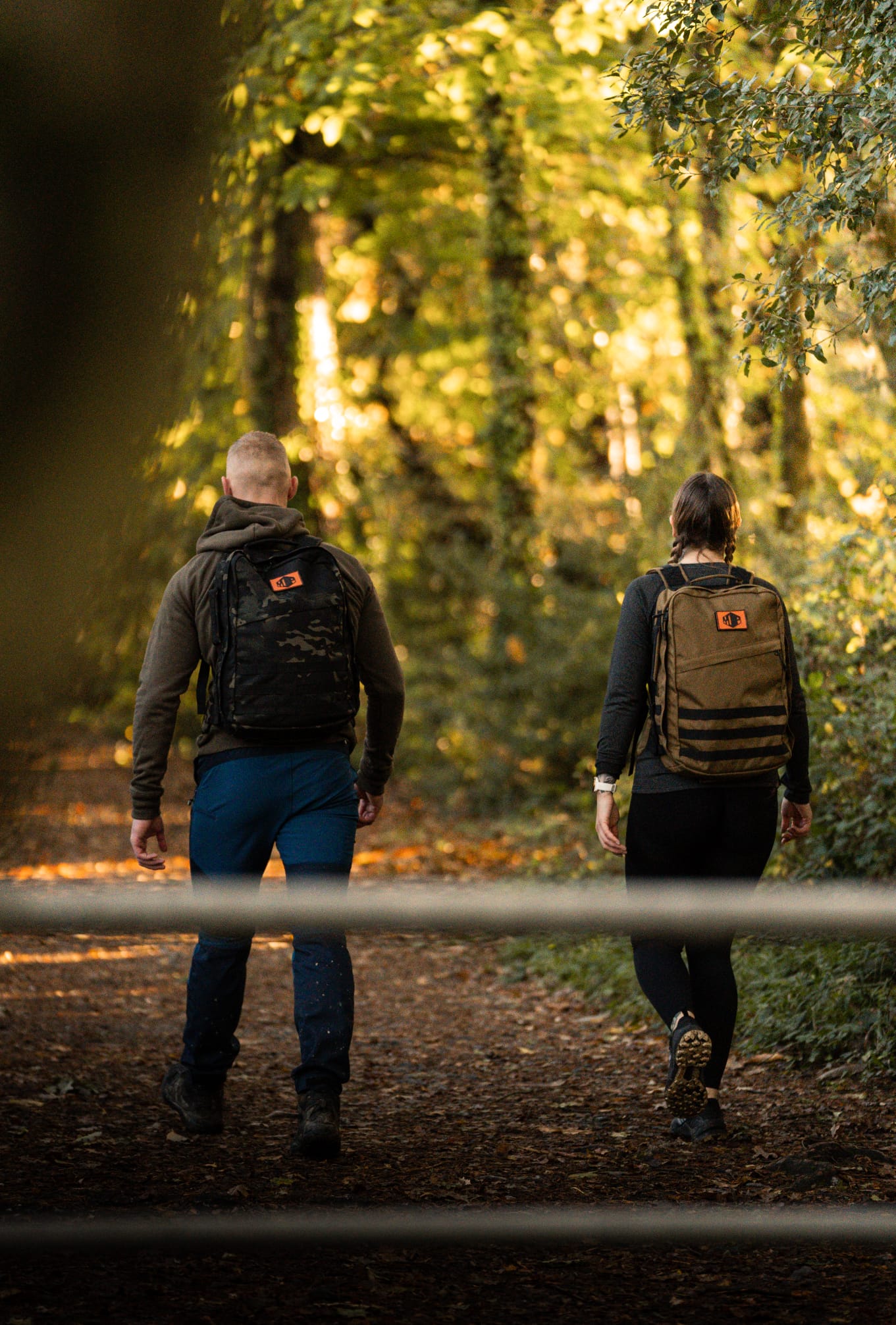Fuelling Your Adventure: A Guide to Pre-Yomp Nutrition

Embarking on a long hike, yomp, or ruck demands mental fortitude, but equally important is providing your body with the right fuel. Your pre-yomp nutrition significantly impacts your performance, endurance, and overall enjoyment. In this guide, we'll explore in detail the types of foods to consider, the benefits they offer, what to steer clear of, the optimal timing for meals, and how to customise your nutrition based on the specifics of your adventure.
Types of Foods
Complex Carbohydrates & Their Benefits
Slow-release energy: Complex carbohydrates such as whole grains, oats, and sweet potatoes are rich in fibre, ensuring a gradual and sustained release of energy. This is essential for maintaining a consistent energy level during the entirety of your hike.
Satiety: Beyond energy, the fibre content in complex carbs contributes to a feeling of fullness, preventing sudden energy crashes.
Examples:
Quinoa: A complete protein source, quinoa offers a blend of amino acids crucial for muscle function. Its high fibre content aids in digestion and provides lasting energy.
Brown rice: Packed with magnesium, brown rice supports muscle and nerve function. The complex carbs in brown rice release energy steadily, making it an ideal choice.
Whole grain pasta: In addition to carbohydrates, whole grain pasta provides essential B vitamins and minerals, promoting overall vitality.
Oats: Known for beta-glucans, oats support heart health and provide a sustained release of energy due to their complex carbohydrates.
Lean Proteins & Their Benefits
Muscle support: Proteins play a pivotal role in muscle repair and maintenance, crucial for sustained physical activities like hiking. Opt for lean protein sources to avoid excess fat intake.
Satiety: The satiating effect of protein helps control appetite, ensuring you stay satisfied during your hike.

Examples:
Grilled chicken: A lean source of protein, grilled chicken provides essential amino acids without excess fat, supporting muscle health.
Turkey: Rich in tryptophan, turkey can enhance mood and reduce perceived exertion during physical activities. It also provides high-quality protein for muscle support.
Greek yogurt: Combining protein with probiotics, Greek yogurt supports gut health, ensuring optimal digestion during your hike.
Lentils: A plant-based protein powerhouse, lentils offer fibre for sustained energy and a range of essential nutrients.
Healthy Fats & Their Benefits
Energy reserve: Fats serve as a concentrated and efficient source of energy, especially beneficial for longer hikes where a lasting fuel reserve is essential.
Nutrient absorption: Some vitamins, like A, D, E, and K, are fat-soluble, meaning they require fat for absorption. Including healthy fats ensures your body can make the most of these vital nutrients.

Examples:
Avocado: Packed with monounsaturated fats, avocados provide sustained energy and support cardiovascular health.
Nuts (almonds, walnuts): Rich in omega-3 fatty acids and protein, nuts are a convenient and energy-dense snack that also supports brain health.
Olive oil: The monounsaturated fats in olive oil contribute to heart health, and its versatility makes it an easy addition to salads or as a cooking medium.
Fatty fish (salmon): A source of omega-3 fatty acids, salmon supports heart health, reduces inflammation, and provides lasting energy for prolonged activities.
Fruits and Vegetables & Their Benefits
Hydration: Fruits and vegetables have high water content, contributing to your hydration levels, which is crucial for maintaining energy and preventing dehydration during your hike.
Vitamins and minerals: Essential for various bodily functions, fruits and vegetables provide a broad spectrum of vitamins and minerals that support overall health and performance.
Examples:
Berries: Rich in antioxidants, berries combat oxidative stress induced by physical activity, supporting recovery and overall well-being.
Bananas: High in potassium and easily digestible, bananas offer a quick source of energy and help prevent muscle cramps.
Spinach: Packed with iron and other essential nutrients, spinach supports oxygen transport in the body, aiding endurance during your hike.
Carrots: A crunchy and hydrating snack, carrots provide vitamins like A and K, promoting eye health and bone strength.
What to Avoid
Sugary Snacks
While tempting for a quick energy boost, sugary snacks often lead to rapid spikes and subsequent crashes in blood sugar levels. Opt for complex carbohydrates that provide sustained energy rather than a fleeting surge.
Heavy, Greasy Foods
These can lead to discomfort and indigestion during physical activity. Avoid foods high in saturated fats, as they can slow digestion and may cause gastrointestinal distress.
New or Unfamiliar Foods
Stick to foods your body is accustomed to, as trying new things on the day of your hike can lead to digestive issues. Save experimentation for your training days, and stick with familiar, easily digestible foods on the day of your adventure.
Meal Timing Guide
2-3 Hours Before
Consume a balanced meal with a good mix of carbs, proteins, and fats. This meal should be rich in nutrients to provide sustained energy throughout your hike. Consider including a lean protein source, complex carbohydrates, and healthy fats.
30-60 Minutes Before
Opt for a smaller snack rich in carbs and moderate in protein, easily digestible to prevent discomfort. This could be a banana with a small handful of nuts or a yogurt with some granola. The emphasis here is on providing a quick energy boost without overwhelming your digestive system.

Tailoring Nutrition to Activity
Short Duration (1-2 hours)
Calories: Aim for around 200-300 calories to provide a quick burst of energy without overloading your system.
Carbs: 30-40g of easily digestible carbohydrates, such as a piece of fruit or a small serving of whole grains.
Fats: Keep fat intake lower (5-10g) to facilitate quick digestion.
Moderate Duration (2-4 hours)
Calories: Increase to 300-500 calories to sustain energy levels throughout the duration of your hike.
Carbs: Aim for 40-60g of carbohydrates from a mix of complex carbs and easily digestible sources.
Fats: Increase to 10-15g to provide a steady source of energy.
Long Duration (4+ hours)
Calories: Depending on the intensity of your activity, aim for 500-800 calories to meet the increased energy demands.
Carbs: Increase to 60-80g, focusing on a mix of complex and simple carbohydrates to sustain energy.
Fats: Increase to 15-20g to provide a lasting fuel reserve for the extended duration.
Proper pre-hike nutrition is a pivotal factor in ensuring you have the stamina and energy to conquer your outdoor challenges. Experiment with different foods during training to find what works best for you, and remember that hydration is equally important. Armed with the right fuel, you'll be ready to make the most of your hiking, yomping, or rucking adventure. Safe travels!



